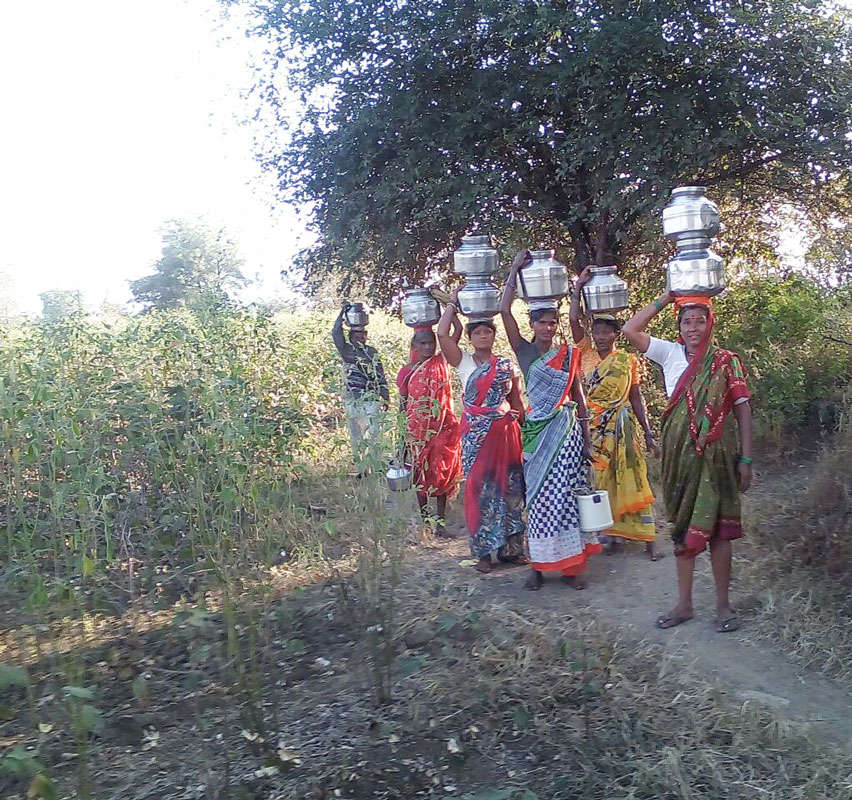
Innovative waterwheels are lifting the weight off the heads of hundreds of women in the drought-prone regions of Maharashtra and Gujarat. In one such initiative recently, six Rotary clubs and three Inner Wheel clubs of Mumbai, RID 3141, distributed 315 waterwheels — an ingenious solution to the burden of rural women carrying water over long distances.
Village women in India have to carry 1–3 pots over their heads depending on their household needs, and make 2–3 trips of 2–5 km in the heat or rain every day. They are prone to spine and back problems because they carry so much weight over their heads, says Amrish Daftary, Rotary Water Projects Avenue Chair, RID 3141.
Now this device is a godsend. I don’t have to go fetch water. There is a tug-of-war between my son and grandson to roll the container to get water.
The waterwheel makes it easy to fetch water from the nearest drinking water source. It is a cylindrical, high-density plastic drum that can hold over 45 litre of water and is fitted with a metal handle, which allows the user to roll it down the road like a trolley, without having to lift the weight. “It eliminates the physical strain of carrying pots on the head, shoulders and waist, and with a 45-litre capacity, the number of trips can also be significantly reduced.”
Recalling his journey in this project, Daftary says that he came across this “unique product developed by an American woman Cynthia Koenig in 2016. She helped me source it from Nilkamal Plastics, the authorised manufacturers of the waterwheels.” The device is also popular in Africa, where it is called the ‘hippo wheel’, and has a 100-litre capacity.
A Rotarian since 1988, and a member of RC Bombay Hanging Garden, he is active in procuring and distributing the waterwheels to households in Digras, Karjat, Palghar and Akola taluks in Maharashtra, and in Gujarat. Since March 2016, his team has distributed over 4,000 waterwheels in various villages. Identifying the recipients is important, he says. Waterwheels are given only to those families who have no water source in their immediate vicinity and had to travel at least 1.5–2 km away from home to fetch water every day. “We identify such beneficiaries with the help of local NGOs and get the clubs to sponsor the waterwheels.” Each device costs around ₹2,200 plus GST. “But for Rotary it is a special rate of ₹2,100. We charge ₹100 from each recipient, for a sense of ownership, and if someone cannot afford it then we give it for free,” he says. Some clubs in New Jersey who were introduced to him by Cynthia had also contributed for this project earlier.
“Unlike the women, village men are reluctant to fetch water using pots. With the waterwheels, men, as well as children, now pitch in to roll home the water needed for the family, making headloads a history for the women,” smiles Daftary.

Lakshmibai (65), a beneficiary from Palghar, is all smiles. “Earlier it used to be an arduous task when I had to carry three pots on my head and make as many trips daily to provide water for my family. I would have neck pain and feel tired. I had fallen down, or my pots dropped from my head several times. Now this device is a godsend. I don’t have to go fetch water. There is a tug-of-war between my son and grandson to roll the container to get water. They find it playful, like a pushcart toy. Even distance doesn’t matter now,” she says.






